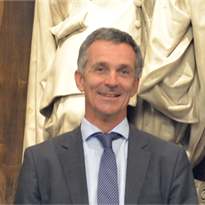Nicholas Ayache is Research Director of class exceptional at Inria, head of the Epione research project team dedicated to e-Patients for e-Medicine, and Scientific Director of the new AI institute 3IA Côte d'Azur. He is a member of the French Academy of sciences and Academy of Surgery. His current research focuses on AI methods to improve diagnosis, prognosis and therapy from medical images and clinical, biological, behavioral and environmental data available on the patient.
N. Ayache was an invited scientist at MIT, Harvard, and Brigham and Woman’s Hospital (Boston) in 2007. He held a Chair of Professor at Collège de France in 2014 where he introduced a new course on the 'Personalized Digital Patient'. He served as Chief Scientific Officer (CSO) of the Institut Hospitalo-Universitaire (IHU) of Strasbourg (2012-2105). N. Ayache graduated from Ecole des Mines (Saint Etienne) in 1980 and obtained his PhD and Thèse d'Etat (Habilitation) from University of Paris-Sud (Orsay, France).
N. Ayache is the author and co-author of more than 400 scientific publications that received 44,000+ citations (h-index 104+) according to Google Scholar. He co-founded seven start-up companies in image processing, computer vision, and biomedical imaging. N. Ayache is co-founder and co-Editor in Chief of the Elsevier journal Medical Image Analysis (IF = 11.148 in 2020).
N. Ayache received the International Steven Hoogendijk Award in 2020, the Grand Prize of the City of Nice in 2019, the Grand Prize Inria - Académie des sciences in 2014, a European Research Council (ERC) advanced grant (2012-2017), the Microsoft Prize for Research in Europe (Royal Society & Academy of Sciences) in 2008, and the EADS Foundation Prize in Information Sciences in 2006. N. Ayache is a Fellow of the American Institute for Medical and Biological Engineering (AIMBE), of the European Alliance of Medical and Biological Engineering and Science (EAMBES) and of the Medical Image Computing and Computer Assisted Intervention (MICCAI) Society from which he received in 2013 the 'Enduring Impact Award'.
Awards
-
Royal Society and Académie des Sciences Microsoft Award
In recognition of his major accomplishments in the development of medical image analysis. In particular, his work on the statistics of three-dimensional shapes, the combination of several imaging modalities, and the development of computational models combining anatomy and physiology.

